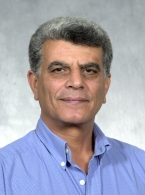
Prof. Avi Ben-Nun
|
1947
-
2019
“What furthered me most in life was that I dared to set high goals”, is what Prof. Ben-Nun used to say. He passed away on January 18, 2019, at the age of 72. He earned his master's degree in microbiology, cum laude, from Tel Aviv University in 1974 and his doctorate in immunology under the advice of Prof. Irun Cohen at the Weizmann Institute in 1981. A year later Avi moved to Boston for his postdoctoral studies at the Department of Genetics at Harvard Medical School. In 1984 he returned as a young scientist to the Department of Immunology at the Weizmann Institute. He was appointed Associate Professor in 1993 and received full professorship in 2007.
The science is still alive: papers dedicated to his memory
1. Kaushansky N.,* A. Kaminitz, H. Allouche-Arnon and A. Ben-Nun. 2019. Modulation of MS-like disease by a multi epitope protein is mediated by induction of CD11c+CD11b+Gr1+ myeloid-derived dendritic cells. J Neuroimmunology.333:476953. *corresponding author
https://doi.org/10.1016/j.jneuroim.2019.04.013
2. Kaushansky N., E. Bakos, S. Becker-Herman, I. Shachar*, and A. Ben-Nun* . 2019. Circulating
picomolar levels of CCL2 downregulate ongoing chronic EAE by induction of regulatory
mechanisms. J Immunol. 203(7):1857-1866 *Co- last author.
https://doi.org/10.4049/jimmunol.1900424
3. Zilkha-Falb, R., Kaushansky N., and A. Ben-Nun"The Median Eminence, a new oligodendrogenic niche
in the adult mouse brain”, Stem Cells report, under minor revision.
Prof. Ben Nun’s research focused on autoimmune diseases, in particular on Multiple Sclerosis (MS). Multiple sclerosis (MS) is a disease of the human central nervous system (CNS), characterized by perivascular inflammation accompanied by primary demyelination and axonal damage. Although the etiology of the disease is unknown, it is believed that MS results from autoimmune mechanisms, leading to the destruction of myelin, presumably initiated by abnormally activated, potentially pathogenic, autoimmune T cells that recognize components of the myelin sheath in the CNS of MS patients. One of Avi’s major contributions, which was considered a breakthrough in the field of immunology, was the in vitro production of T cells against myelin epitopes. Following injection of these cells, mice develop MS-like disease (experimental autoimmune encephalomyelitis, EAE). This find was published in the top-tier journal Nature and paved the way for the development of therapies for MS and several other diseases. Prof. Ben Nun’s research contributed to the identification of potential target antigens in MS, e.g. myelin oligodendrocyte glycoprotein (MOG), myelin-oligodendrocytic basic protein (MOBP), and oligodendrocye specific protein (OSP). Injection of these antigens to laboratory animals resulted in EAE and T-cell reactivity against these antigens in MS patients were detected. MS is a complex and dynamic anti-myelin autoimmune disease. Prof. Ben Nun therefore believed that the ultimate goal of immune therapy for MS is a multi-target approach to immune-specific modulation that targets only the deleterious autoimmune T cells without compromising the immune competence of normal physiological functions. He also examined the use of stem cells for the regeneration and repair of damaged myelin in MS. Prof. Ben-Nun's scientific contribution constitutes a milestone in the world of immunology and in the study of autoimmune diseases in particular

















